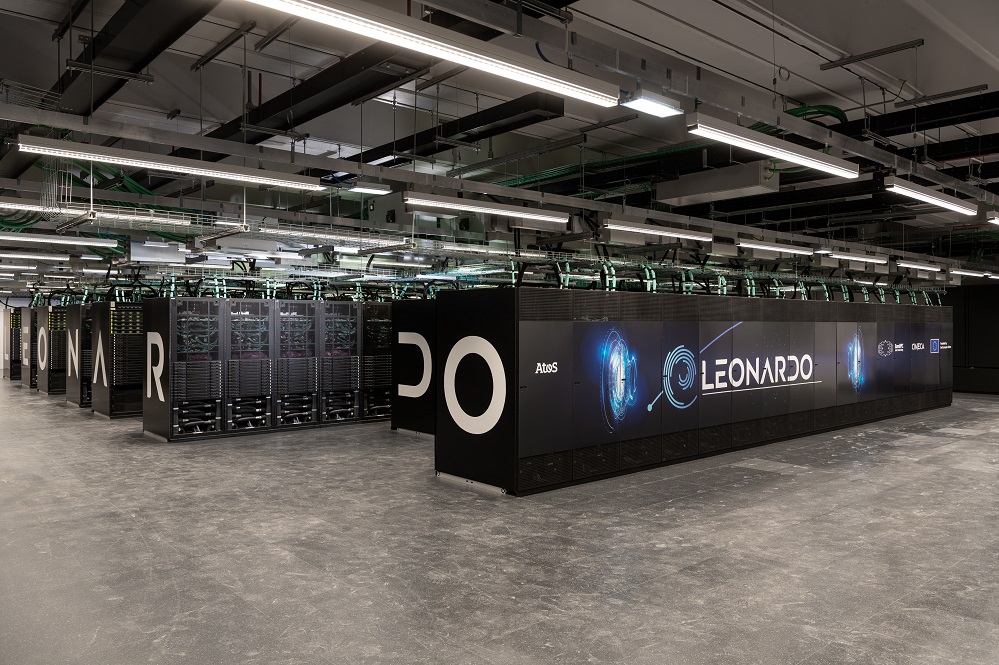New call for proposal for the Slovak scientific community: access to Leonardo supercomputer
The Leonardo Consortium, composed of six European countries led by Italy, procured and in November 2022 put into operation the currently sixth most powerful supercomputer in the world Slovakia, as one of the consortium members, provides its expertise in the field of HPC through the Computing Center of the Slovak Academy of Sciences and offers high-level technical and engineering support to user communities. Thanks to this collaboration, Slovak users have a unique opportunity to participate in a national call and gain access to the Leonardo system.
The supercomputer Leonardo has a performance of approximately 250 PFlop/s, with a total allocation available for Slovak projects being 56,000 GPU node-hours and 25,000 CPU node-hours per year. Therefore, in collaboration with the National Supercomputing Center, the Computing Center of the Slovak Academy of Sciences is opening the first call for proposals to access Leonardo's computing resources.Given the size of the allocation, support will be provided to a smaller number of projects, primarily those that require simultaneous utilization of a large number of computing nodes.
Access is open to all fields of science and research, and eligible applicants are from Slovak public universities or institutions of the Slovak Academy of Sciences. Supported projects should enable progress and innovation in their chosen area, with added value for addressing societal and/or technological challenges in Slovakia.
Applications used in projects should be thoroughly tested, demonstrating high efficiency and scalability on HPC systems or the need for extensive simulations that require a significant amount of CPU/GPU time. These should be highly parallelized applications capable of efficiently utilizing the available resources, the allocation of which would be challenging on the current national HPC infrastructureDevana supercomputer ). The computational power requirement and resource utilization must be clearly and comprehensively described in the proposal. You can find the specifications of individual Leonardo modules HERE.
The call is open until January 31, 2024. Evaluation and selected projects will be published two weeks after the deadline, and successful applicants will be informed about the next steps via email. Individual projects will be evaluated by the expert staff of VS SAV and NSCC with regard to scientific contribution and the most efficient use of computing capacities. Projects with a maximum duration of 12 months can be submitted through the user portal
Before submitting an application, we ask interested parties to thoroughly familiarize themselves with the conditions of this call..
In case of any questions or uncertainties, please contact us at eurocc@nscc.sk
 BeeGFS in Practice — Parallel File Systems for HPC, AI and Data-Intensive Workloads 6 Feb - This webinar introduces BeeGFS, a leading parallel file system designed to support demanding HPC, AI, and data-intensive workloads. Experts from ThinkParQ will explain how parallel file systems work, how BeeGFS is architected, and how it is used in practice across academic, research, and industrial environments.
BeeGFS in Practice — Parallel File Systems for HPC, AI and Data-Intensive Workloads 6 Feb - This webinar introduces BeeGFS, a leading parallel file system designed to support demanding HPC, AI, and data-intensive workloads. Experts from ThinkParQ will explain how parallel file systems work, how BeeGFS is architected, and how it is used in practice across academic, research, and industrial environments. When a production line knows what will happen in 10 minutes 5 Feb - Every disruption on a production line creates stress. Machines stop, people wait, production slows down, and decisions must be made under pressure. In the food industry—especially in the production of filled pasta products, where the process follows a strictly sequential set of technological steps—one unexpected issue at the end of the line can bring the entire production flow to a halt. But what if the production line could warn in advance that a problem will occur in a few minutes? Or help decide, already during a shift, whether it still makes sense to plan packaging later the same day? These were exactly the questions that stood at the beginning of a research collaboration that brought together industrial data, artificial intelligence, and supercomputing power.
When a production line knows what will happen in 10 minutes 5 Feb - Every disruption on a production line creates stress. Machines stop, people wait, production slows down, and decisions must be made under pressure. In the food industry—especially in the production of filled pasta products, where the process follows a strictly sequential set of technological steps—one unexpected issue at the end of the line can bring the entire production flow to a halt. But what if the production line could warn in advance that a problem will occur in a few minutes? Or help decide, already during a shift, whether it still makes sense to plan packaging later the same day? These were exactly the questions that stood at the beginning of a research collaboration that brought together industrial data, artificial intelligence, and supercomputing power. Who Owns AI Inside an Organisation? — Operational Responsibility 5 Feb - This webinar focuses on how organisations can define clear operational responsibility and ownership of AI systems in a proportionate and workable way. Drawing on hands-on experience in data protection, AI governance, and compliance, Petra Fernandes will explore governance approaches that work in practice for both SMEs and larger organisations. The session will highlight internal processes that help organisations stay in control of their AI systems over time, without creating unnecessary administrative burden.
Who Owns AI Inside an Organisation? — Operational Responsibility 5 Feb - This webinar focuses on how organisations can define clear operational responsibility and ownership of AI systems in a proportionate and workable way. Drawing on hands-on experience in data protection, AI governance, and compliance, Petra Fernandes will explore governance approaches that work in practice for both SMEs and larger organisations. The session will highlight internal processes that help organisations stay in control of their AI systems over time, without creating unnecessary administrative burden.
